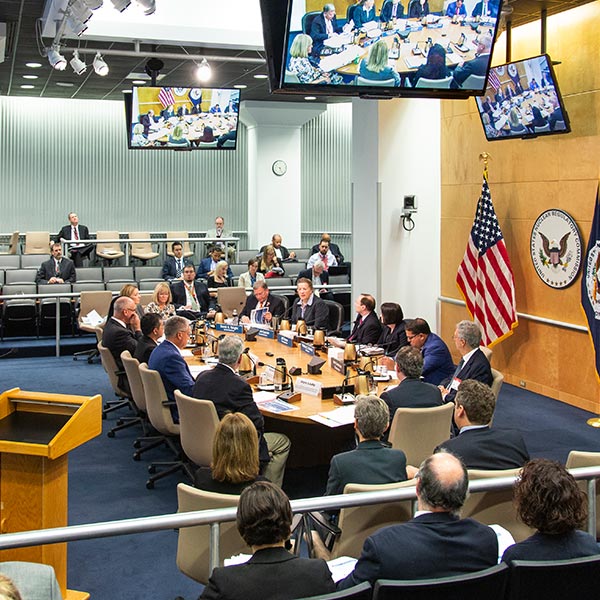NERC’s Stakeholder Engagement Team (SET) has finalized its proposal to merge the Planning, Operating and Critical Infrastructure Protection committees, setting the stage for expected approval by the Board of Trustees on Nov. 5.
As expected, the NERC Agrees to Increase New Committee’s Membership.)
“That [demand from members] was pretty loud and clear,” Greg Ford, chairman of the Member Representatives Committee, said Thursday at the MRC’s premeeting informational conference call.
The SET also eliminated a requirement that committee members have executive-level experience.
The membership also will include representation from each interconnection. “That was a request that came through load and clear as well,” Ford said.
The transition from the three committees to the new Reliability and Security Technical Committee (RSTC) — a revised name from the original proposal, which some stakeholders feared would be confused with the Reliability Issues Steering Committee (RISC) — was also extended into June.
Under the new schedule:
- Nov. 5: The board will consider the proposal and RSTC charter and transition plan. If approved, the board will appoint the new committee’s chair and vice chair at the same time.
- Nov. 6 to Dec. 6: Nominations will be open for sector representatives, with sector elections, if necessary, conducted by Dec. 20.
- Dec. 9 to Jan. 3, 2020: At-large nominations will be accepted, with the Nominating Committee developing a slate of at-large members by Jan. 15 for presentation to the board.
- Feb. 6: Board appoints RSTC sector and at-large members.
- Feb. 7 to May 29: RSTC develops transition plan and work plans for RSTC and subcommittees.
- March 3-4: OC, PC and CIPC meet. The RSTC will hold its first meeting March 4 to establish the Nominating Subcommittee, Executive Committee and perform other administrative items.
- June 2020: OC, PC and CIPC will meet for final work plan approvals and to complete any other approvals. The RSTC will hold initial regular meeting with subcommittee reports and other agenda items.
Terms for the new committee members will expire in June of alternating years. The initial membership will be split between two- and three-year terms, after which terms will run for two years.
The proposed changes didn’t come without misgivings from some stakeholders. (See NERC Board Hears Debate over Committee Reorg.) But Ford said he was happy with the way the process played out.
“There was a lot of open, honest, good discussion all the way back to the first meeting [the SET] had,” he said. “I feel like we’re in a good place.”
He had special praise for the work of Exelon’s Jennifer Sterling and NERC Chief Engineer Mark Lauby. “I thought you herded us cats very well,” he joked.
MRC Governance Guidelines, EMP Task Force
Thursday’s preview of the MRC’s Nov. 5 meeting also included a discussion of revised Governance Guidelines, which were developed to reduce the number of documents guiding the committee to just two: the guidelines and the NERC Bylaws. The Approved Policy on Minutes of MRC Meetings, Framework for the Operation of the MRC and NERC MRC Reference Document would be eliminated.
NERC Director of Engineering and Standards Howard Gugel also provided a brief update on the Electromagnetic Pulse (EMP) Task Force’s Strategic Recommendations Report.
The comment period on the draft report closed at the end of September. (See EMP Task Force Calls for Federal Funding.)
The task force will review the comments and finalize their recommendations in October for presentation to the board at the Nov. 5 meeting.





